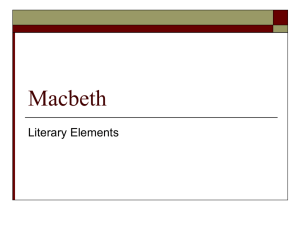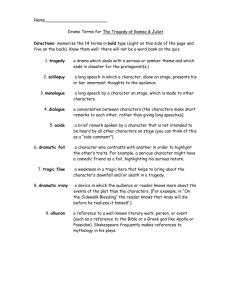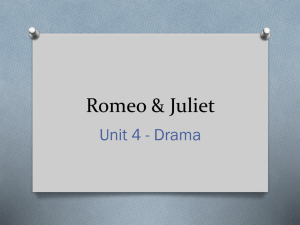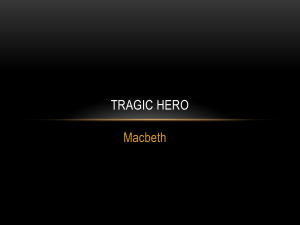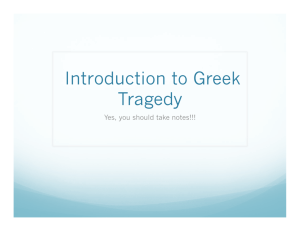BASIC DEFINITIONS OF TRAGEDY
advertisement
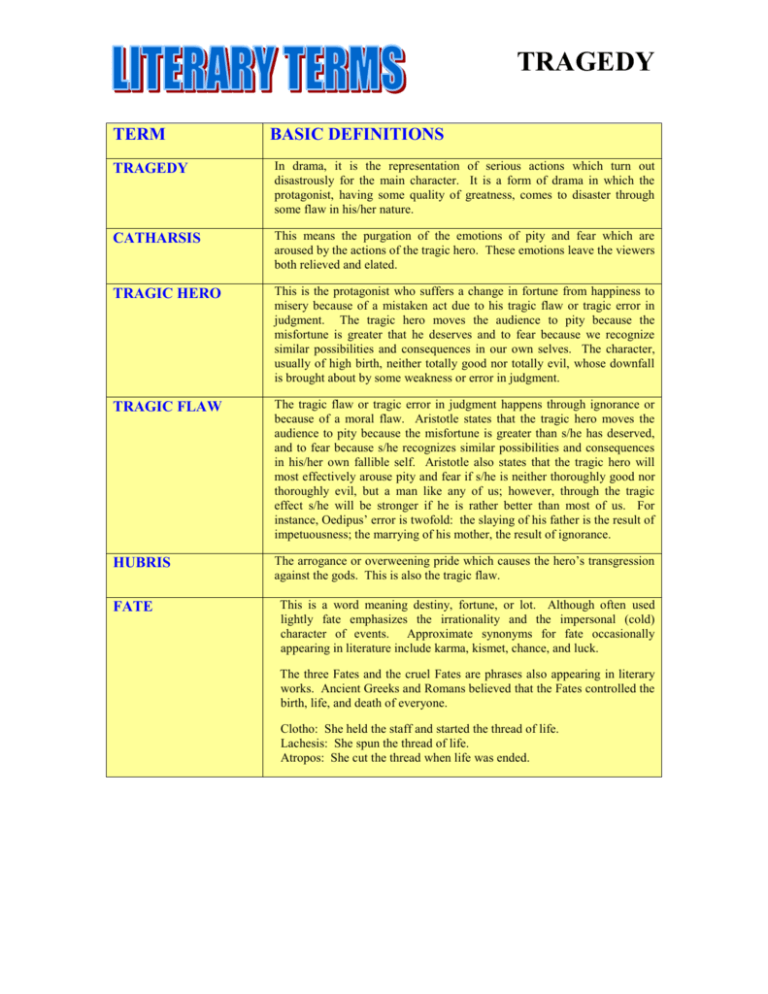
TRAGEDY TERM BASIC DEFINITIONS TRAGEDY In drama, it is the representation of serious actions which turn out disastrously for the main character. It is a form of drama in which the protagonist, having some quality of greatness, comes to disaster through some flaw in his/her nature. CATHARSIS This means the purgation of the emotions of pity and fear which are aroused by the actions of the tragic hero. These emotions leave the viewers both relieved and elated. TRAGIC HERO This is the protagonist who suffers a change in fortune from happiness to misery because of a mistaken act due to his tragic flaw or tragic error in judgment. The tragic hero moves the audience to pity because the misfortune is greater that he deserves and to fear because we recognize similar possibilities and consequences in our own selves. The character, usually of high birth, neither totally good nor totally evil, whose downfall is brought about by some weakness or error in judgment. TRAGIC FLAW The tragic flaw or tragic error in judgment happens through ignorance or because of a moral flaw. Aristotle states that the tragic hero moves the audience to pity because the misfortune is greater than s/he has deserved, and to fear because s/he recognizes similar possibilities and consequences in his/her own fallible self. Aristotle also states that the tragic hero will most effectively arouse pity and fear if s/he is neither thoroughly good nor thoroughly evil, but a man like any of us; however, through the tragic effect s/he will be stronger if he is rather better than most of us. For instance, Oedipus’ error is twofold: the slaying of his father is the result of impetuousness; the marrying of his mother, the result of ignorance. HUBRIS The arrogance or overweening pride which causes the hero’s transgression against the gods. This is also the tragic flaw. FATE This is a word meaning destiny, fortune, or lot. Although often used lightly fate emphasizes the irrationality and the impersonal (cold) character of events. Approximate synonyms for fate occasionally appearing in literature include karma, kismet, chance, and luck. The three Fates and the cruel Fates are phrases also appearing in literary works. Ancient Greeks and Romans believed that the Fates controlled the birth, life, and death of everyone. Clotho: She held the staff and started the thread of life. Lachesis: She spun the thread of life. Atropos: She cut the thread when life was ended. TRAGEDY From: http://academic, Brooklyn.cuny/English/melani/cs6/tragedy.html ELIZABETHAN AND A distinctly English form of tragedy begins with the Elizabethans. SHAKESPEAREAN The translation of Seneca and the reading of Aristotle’s Poetics were major TRAGEDY influences. Many critics and playwrights, such as Ben Jonson, insisted on observing the classical unities of action, time and place (the action should be one whole and take place in one day and in one place). However, it was romantic tragedy, which Shakespeare wrote in Richard II, Macbeth, Hamlet, and King Lear, which prevailed. Romantic tragedy disregarded the unities (as in the used of subplots), mixed tragedy and comedy, and emphasized action, spectacle, and –increasingly—sensation. Shakespeare violated the unities in these ways and also in mixing poetry and prose and using the device of a play-within-a-play, as in Hamlet.

